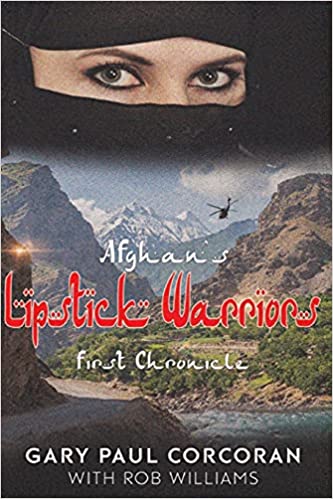Author Gary Paul Corcoran Brings The Struggle For Women’s Rights in Afghanistan To Life In His Compelling New Novel, “Afghan’s Lipstick Warriors: First Chronicle”, Now Available In Paperback And Kindle
With our band of lipstick warriors cornered and a swarm of Taliban soldiers preparing to launch a lethal offensive against them, one CIA operative, aided by his Kabul station chief and their crew of behind the scenes techies, go completely off the reservation in an effort to save them.
[Charlestown, RI] The fall of the Afghan government has brought Taliban barbarism to the forefront of media headlines worldwide once again. Summary executions, schools and infrastructure destroyed, women oppressed and the page turned back on human rights. The atrocities of this militant organization have long been catalogued, and now to this mix arrives the unique perspective of Gary Paul Corcoran’s recently released novel, ‘Afghan’s Lipstick Warriors: First Chronicle’. If the sudden and complete collapse of the Afghan Army has reinforced anything, it is the very premise of Mr. Corcoran’s novel. The women of Afghanistan have only one hope. Defend themselves. The men will not do it for them.
‘Afghan’s Lipstick Warriors’ revolves around the life of Saarah Khalil, born in a secluded mountain village, in the shadows of the Hindu Kush, and having come of age mostly unaware of the endless wars and tribal strife going on beyond her sheltered world. Then one day, the Taliban came and everything changed. Faced with the prospect of a forced marriage to a Taliban warlord, Saarah flees to a women’s shelter in Kabul, where she is confronted with a simple truth. Her hopes and dreams, and those of every woman in Afghanistan, will be meaningless if the Taliban are able to retake power. And so a decision must be made. Will she lie down like a dog before them? Or take up arms and fight?
This sweeping tale of love and war and personal destiny is played out against the backdrop of an American government at war with itself, with the CIA doing everything in its clandestine powers to support this fledgling band of women warriors while the State Department, at the direction of a new president, appears determined to stamp out what the administration views as upending their neat and orderly withdrawal plans. The setting for the tale is several months before the stunning collapse of the Afghan government, when the thought of the Taliban imposing their strict interpretation of Sharia upon Afghanistan was yet unthinkable, when Afghans still held onto their frail hopes of a better world. ‘Afghan’s Lipstick Warriors: First Chronicle’ not only champions those hopes, but presages its soon to be published sequel, ‘Afghan’s Lipstick Warriors: Darkness Falls, in which a determined movement of both men and women shake off the grim reality of their defeat and rejoin the fight for freedom.
Quote: In the course of human history, there is no greater miscarriage of justice than the one perpetrated by men upon women. And so the hour has come for every woman to hold aloft this simple truth, for it haunts the mind of every tyrant, despot and dictator. A tiger is only tamed for so long as it accepts the whip.
Gary Corcoran is available for media interviews and can be reached using the information below, or by email at gpcorcoran@yahoo.com. ‘Afghan’s Lipstick Warriors’ is available at Amazon and other book retailers. More information is available at his website at garypaulcorcoran.com.
About Gary Paul Corcoran:
The product of an Irish/Italian family, Mr. Corcoran was transplanted as a boy from the clapboard New England of his youth to the cookie cutter, stucco subdivisions that began to litter the disappearing ranches and orange groves south of Los Angeles in the 1960s.
True to his rebellious nature and the folk music/coffee house idealism that helped shape his early worldview, Mr. Corcoran chose to resist the Vietnam War, was a man without a country for several years and can count incarceration in a Mexican prison as one of his many colorful experiences during that era.
Having pursued a love of reading and writing in various forms all his life, Mr. Corcoran finally took this passion seriously around the turn of the millennium and has dedicated the remainder of his days to authorship.
The author of eight previous novels, Mr. Corcoran’s rough and tumble early experiences animate all of his literary works, from his Michael Devlin crime series to his special forces adventures to his tales of romance. Mr. Corcoran is currently working on a sequel to Afghan’s Lipstick Warriors and expects to publish it by the end of 2021.
In completing the karmic circle, the author recently returned to the New England of his youth and now resides along the coast of Rhode Island.
Contact:
Gary Paul Corcoran
gpcorcoran@yahoo.com
garypaulcorcoran.com

